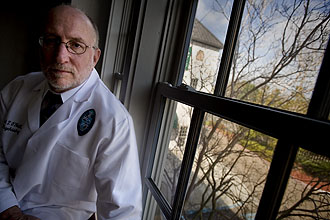Mental Illness: Sane Dialogue Needed
Dr. Patrick O'Neill is disturbed by the word “crazy” being tossed around recently in the news media. “It's a shame you need a tragedy to bring mental illness to the front page, and you hate to have the dialogue driven by violence,” says the professor of clinical psychiatry at the Tulane University School of Medicine.

Psychiatrist Patrick O'Neill, an advocate for mental health care, advises, “Don't deny it, don't avoid it, and don't wait if you have concerns” when you observe signs of mental illness in someone you know. (Photo by Paula Burch-Celentano)
O'Neill, associate chair for clinical affairs in the Department of Psychiatry and Behavioral Sciences, is concerned about the decreasing access to mental health services, particularly for those with severe and chronic mental illnesses. Across the nation, it is becoming a public health crisis, he says.
“Last month, Mississippi closed 185 psychiatric [hospital] beds,” O'Neill says. “There are no public psychiatric beds in Oregon. Yet the L.A. county jail is the largest mental illness facility in the country.” He expects the situation to get worse, with budget deficits facing 46 states.
In Louisiana, O'Neill is director of a program that uses telemedicine (video conferencing) to provide psychiatric consultations with mentally ill people in remote rural areas. He oversees 150 hours each week of these clinical consultations.
According to the National Alliance on Mental Illness, serious mental illnesses schizophrenia, bipolar disorder and substance abuse commonly develop in college-aged individuals. They may not recognize that they are becoming ill; a lack of awareness that they are sick frequently accompanies mental illness.
“Don't deny it, don't avoid it and don't wait if you have concerns,” O'Neill advises family members and close friends who observe unsettling symptoms in an individual. “Don't try to convince yourself that it'll get better on its own.”
The Tulane Student Health Center and Educational Resources and Counseling provide mental health services for students. After hours, individuals concerned about a mental health emergency on the uptown campus should call the Tulane University Police Department emergency number, 504-865-5911, and an officer will be dispatched to conduct a “welfare check” to assess the situation. The emergency phone number for the downtown health sciences campus is 504-988-5555.
